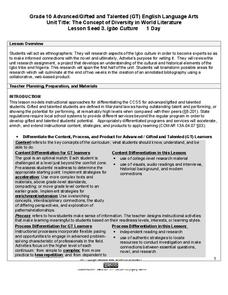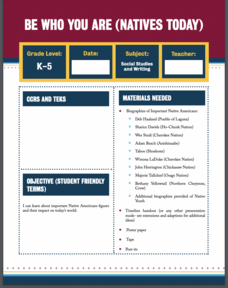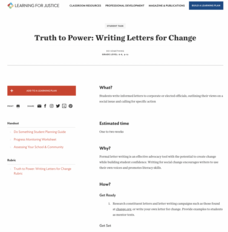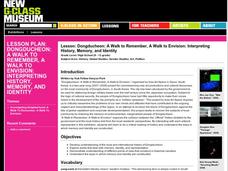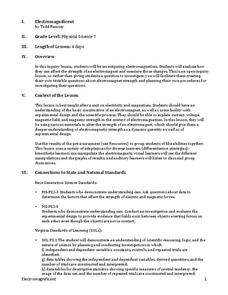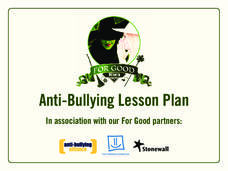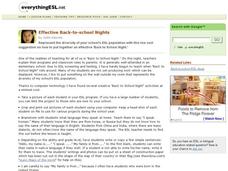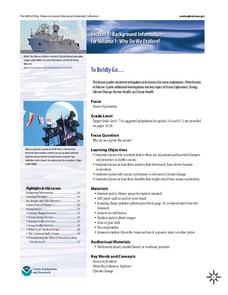Curated OER
Perceptions of War
Tenth graders share perspectives on war with Iraq with students from various countries, and write position papers expressing specific stance on issues.
Maryland Department of Education
The Concept of Diversity in World Literature Lesson 3: Igbo Culture
What cultural concepts must readers understand in order to connect to Things Fall Apart? As part of their study of Chinua Achebe’s novel, class members research Nigeria and the Igbo culture to create a collaborative, web-based,...
Voices of a People's History
Voices in The Classroom
Everyone's perspective of the past is different. A thought-provoking unit gives young academics the opportunity to explore their perspectives on history and their neighborhoods. Based on the work of Howard Zinn, each lesson explores...
National Endowment for the Humanities
Lesson 1: On the Road with Marco Polo: A Boy in 13th Century Venice
Learners investigate Marco Polo's life as a young boy in 13th century Venice. They analyze maps, explore various websites, complete a chart and answer discussion questions, and create a travel brochure about visiting 13th century Venice.
Curated OER
Be Who Your Are
An engaging video begins a lesson all about the representation of Native Americans in all types of careers. Following a discussion about the video, scholars participate in a gallery walk showcasing various Native American figures. Pupils...
Teaching Tolerance
Act Up! Drama for Justice
A lesson turns young historians into playwrights to understand and speak out against social injustice. Pupils work individually or in groups to write and perform monologues that deliver personal messages on social justice. Writers then...
Teaching Tolerance
Truth to Power: Writing Letters for Change
Can letter writing really create social change? Pupils create and mail formal letters addressing a specific organization to promote social change they wish to see. Class members reflect on the process and responses they received in small...
Curated OER
Cross-Cultural Dialogue Lesson
Use the Peace Corps to explore a different place and different perspectives. Your class reads the personal narrative "Cross-Cultural Dialogue" by Roz Wollmering, completing an attached story frame sheet in preparation for a class...
Curated OER
Lesson: Dongducheon: A Walk to Remember, A Walk to Envision: Interpreting History, Memory, and Identity
Cultural discourse can start through a variety of venues. Learners begin to think about how our minds, memories, and identities shape our attitudes toward culture and history. They analyze seven pieces from the Dongducheon art exhibit...
Curated OER
Applying KWL Guides to Sources with Elementary Students
What is a KWL chart? Here is a well thought-out activity that has learners use KWL charts to gain historical perspective. Your class examines primary sources about historical events and identifies what they know, want to know, and,...
STEM for Teachers
Electromagnificent
This physics pun really hertz, but this STEM lesson plan can help. The inquiry-based activity has young scientists create a testable question about electromagnetic strength; plan and implement their own experiments; and record and...
Curated OER
My Arkansas Family Tree
Here is a two-part lesson that introduces learners to genealogy by having them create family trees, and map the movements of their ancestors. While this resource is designed for kids who live in Arkansas, it certainly can be adapted for...
K20 LEARN
To Ban or Not to Ban? Intellectual Rights and Responsibilities: Banned Books, Censorship Part 2
After examining different perspectives on book banning, scholars select a book from a list of frequently banned books and research the controversies surrounding it. They then craft an argument about their chosen book, including arguments...
Macmillan Education
What Do You See?
Encourage learners to develop greater self-awareness and an understanding of perception versus reality. Here you'll find a life skills lesson that includes worksheets, discussion, and brainstorming activities on the topic of how we see...
Museum of Disability
Don't Laugh at Me
You can prevent bullying in your classroom by addressing kindness, empathy, and acceptance with your littlest learners early on. After reading Don't Laugh at Me by Steve Seskin and Allen Shamblin, kids discuss the ways that words...
Stanford University
What Is History?
Five important tenets of any social studies class are available for young historians with a poster that defines history as an account of the past. It encourages learners to question reliability of an author's perspective, as well as...
Anti-Bullying Alliance
Anti-Bullying Lesson Plan
Wicked is not just a Tony Award winning broadway musical. It also makes for a strong base to teach character education, specifically anti-bullying. Scholars listen, discuss, role play, and show what they know through a group...
Curated OER
Effective Back-to-School Nights
Here is an engaging and creative project to do with your ESL learners in preparation for back to school night. A digital camera is used to photograph each pupil, and everyone completes a short writing assignment that goes along with...
Earth Day Network
Staying Green While Being Clean
Clean up the environment with a lesson that focuses on replacing hazardous cleaning supplies with green, environmentally-friendly products. Using a dirty patch of surface as a control area, kids clean other parts of various surfaces...
NOAA
To Boldly Go...
When we think of ocean exploration, many of us have visions of sunken pirate ships full of treasure or mysterious creatures of the deep. What really motivates deep-sea investigation? The first in a series of diverse six-part lessons...
Teaching Tolerance
Reflection: What’s Your FRAME?
Encourage your class to recognize the diversity in the beliefs and backgrounds of their peers. Learners use the acronym FRAME to consider culture, background, and life experiences.
EngageNY
End of Unit Assessment: Perspectives on Natural Disasters
Caption this! Scholars complete the end of unit assessment by rereading In the Middle of the
Storm. Learners answer written response questions about the text, and then create drawings to accompany their work. To finish, they caption...
Curated OER
Telecollaboration Lesson
Sixth graders explore the Caribbean sea and the Arctic ocean. They become familiar with the living conditions of others. Students investigate the geographic location of each area. They become familiar with important events that helped...
Missouri Department of Elementary
Happy, Sad, Scared and Mad: All Belong To Me
"What are feelings?" and "Why are feelings important to understand?" are the essential questions of a instructional activity that boosts self-awareness. Scholars discuss the four basic emotions—happy, sad, scared, and...

